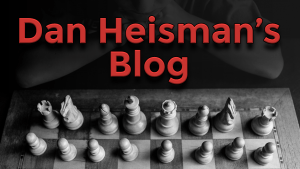Q&A with Coach Heisman Aug 17, 2012
This week's show, as always, featured an eclectic set of questions on all topics. One viewer asked what was the most beautiful game in literature and I responded "Beauty is in the eyes of the beholder. There's many games I find quite beautiful, but one is Szabo-Lloyd, Hastings 1960-61":
Any short annotation would not do this game justice. Suffice it to say that White's 25th move was the mistake that allowed much of the beauty. 25.Qc2 was correct when White is doing fine. But after 25.Rb1? Nf5! Black get the second knight outpost on the third rank (!) and is doing well as the board turns dark. At that point Black has full positional compensation for the queen sacrifice. The further error 29.Nh3? starts White down a dark and slippery slope. I don't have the time-stamping but, obviously, the players got into time trouble, Black missing the easy zwischenzug 37...Nc2+, which would have won the queen back for even less. A beautiful and memorable game! For the record, Black won on the 47th move; the final few irrelevant moves were not given in British Chess Magazine, the original source of the game.
During the show we talked about quite a bit of my existing literature, which gave me the chance to show off a little of my writings. For example, I referenced my website's Book Recommendation page (rather than give the long URLs, it is easier to just go to the alias www.danheisman.com and click on the appropriate links on the left, in this case "Recommended Books"), my award-winning Novice Nook columns to help players of all levels get better ("Novice Nooks**") and my recent spate of blogs at blog.chess.com/danheisman, which can be thought of as mini Novice Nooks  .
.
I got the usual question "I am 1400 - what books should I read to improve (or get to 1700 or...)?" My answer was that it is impossible to tell - perhaps you are 1400 because you play too fast, or too slow, or don't recognize basic tactics quickly and accurately. My formula for everyone begins:
SLOW => SAFE => ACTIVE = All other strategies
Most weaker players read advanced books like Karpov's Best Games or even Silman's How to Reassess Your Chess but don't know a lot about taking their time to learn how to look around and analyze and evaluate better to find better moves. True, most advanced classics like Silman's or Nimzovich's My System are very well written and understandable, but that doesn't mean that their advice is the one that going to fit your needs. A lot more on that in one of my first well-received Novice Nooks Chess Books and Prerequisites (http://www.chesscafe.com/text/heisman06.pdf), which was greatly updated in my book A Guide to Chess Improvement 
Another question was the ratio between study and play time. I quoted GM Maurice Ashley who said (in his seminar here in Philadelphia) that if you are going to be really good you are going to play in many weekend tournaments so for good players you will end up playing somewhat more than you study. In general, chess is not the kind of game where you lock yourself in the closet for a few years until you are "good". Instead you have to go out and play long time control games slowly. I mentioned that GM Lenderman went from beginner to GM in about 11 years, but he averaged about 1.5 USCF-rated tournaments per week! No wonder youngsters have it better when it comes to improvement. Many of my students think that they have some real competition if they can play 3-4 tournaments per year.
Luckily, chess.com is aware of these needs and is working to provide an environment where finding and playing lots of long time-control games will be much easier. Moreover, apparently our new Dan Heisman Chess Learning Center group here on chess.com is helping with some impetus (no, it's not me - the group members get the credit ).
).



